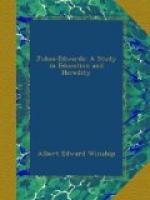At the second presidential election Senator Burr received one vote in the electoral college, at the third he received thirty, and in the fourth received seventy-three. Jefferson also received seventy-three and the election was thrown into the house. This was in 1800 and Mr. Burr was forty-years of age. The choice lay with New York, which could be carried by no man but Aaron Burr.
Alexander Hamilton was the leader of the Federalists. He also was of New York. It was a battle of the giants. These two men measured swords. The presidency of the United States was the prize both parties—the Federalists and the Democrats—were seeking. New York had always been with the Federalists. In this great struggle it went against Hamilton and for Burr. This ended the political career of Hamilton, and would have done so had he lived longer. He was one of America’s greatest statesmen, but one of the poorest politicians. No one could get along with him but Washington, and when he died the political end of Hamilton came.
Jefferson and Burr each received seventy-three votes for president, and Adams received sixty-five. New York had twelve votes, so that if she had remained with the Federalist candidate Adams, he would have won, seventy-seven to sixty-one. This defeat angered Hamilton beyond endurance. He and Burr had been deadly rivals for thirty years, first for the love of woman, then for military preferment, and later in the political arena. When Burr established the Manhattan bank, Hamilton’s brother-in-law, inspired by Hamilton, attacked Burr’s motive, with the result of a duel in which neither was harmed.
Notwithstanding Hamilton’s greatness, he was always in trouble with men and women. He never ceased his abuse of Burr, whose election as senator angered him. Later, when Burr was the choice of congress as minister to Paris, backed especially by Madison and Monroe, Hamilton succeeded in compassing his defeat. Again, when Adams had decided upon some important appointment for Burr, Hamilton succeeded in defeating him. This made Burr’s promotion to the vice-presidency and his own downfall the more exasperating to Hamilton.
Four years passed. Burr won high honor as president of the senate, and the party nominated him for governor of New York with practical unanimity. This was too much for Hamilton, who had nothing to lose by indulging his enmity to the full. The campaign against Burr was one of the basest on record. It was one of vilification. Being vice-president, he was at a disadvantage when it came to conducting the campaign, and he was defeated.
There were many features of this campaign that were peculiarly annoying to Burr, and for the second time in his life he resorted to the duel, and Hamilton was killed. Had Burr died in that hour, history would have a different place for him as well as for Hamilton, but in his death Hamilton was glorified. The most preposterous stories, such as his firing into the air, were invented and believed. The time and the conditions were as bad as they could be for Burr. The North never condoned a duel that ended fatally, and then less than ever. I have no word of apology to offer for the duel. It was weakness, as it always is, and from it came all the ills that befell Aaron Burr.




